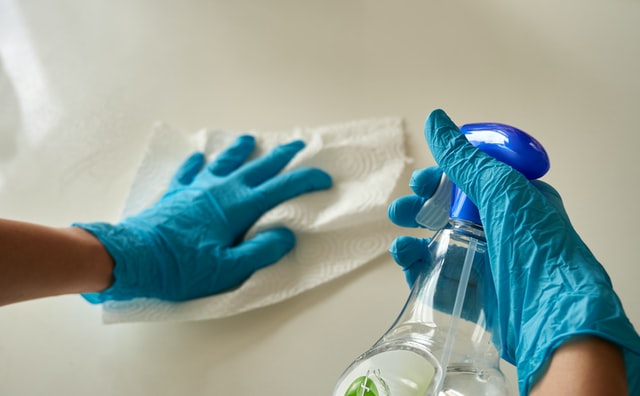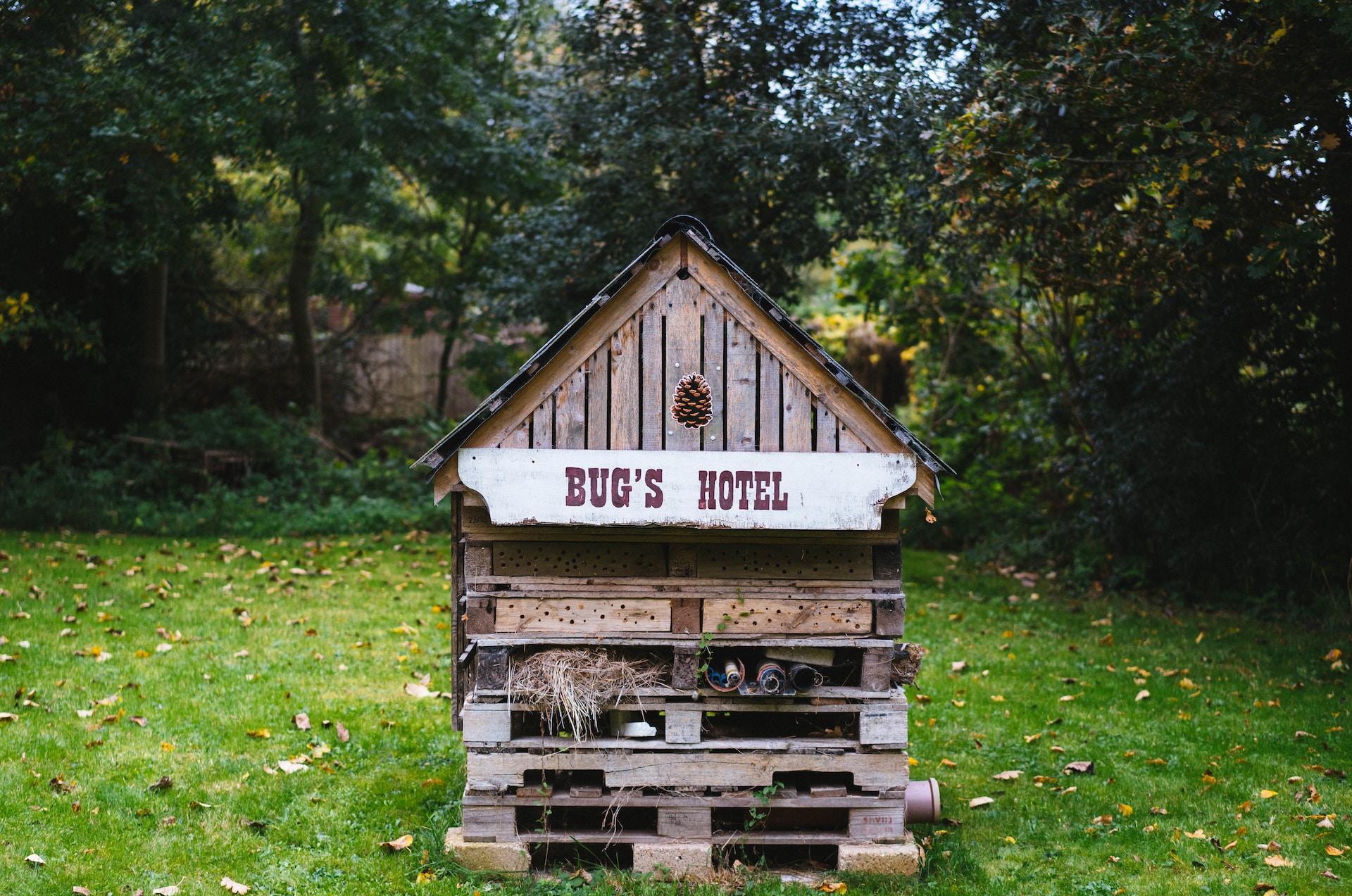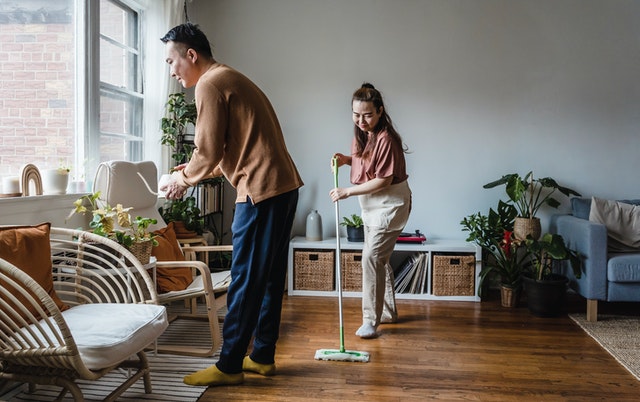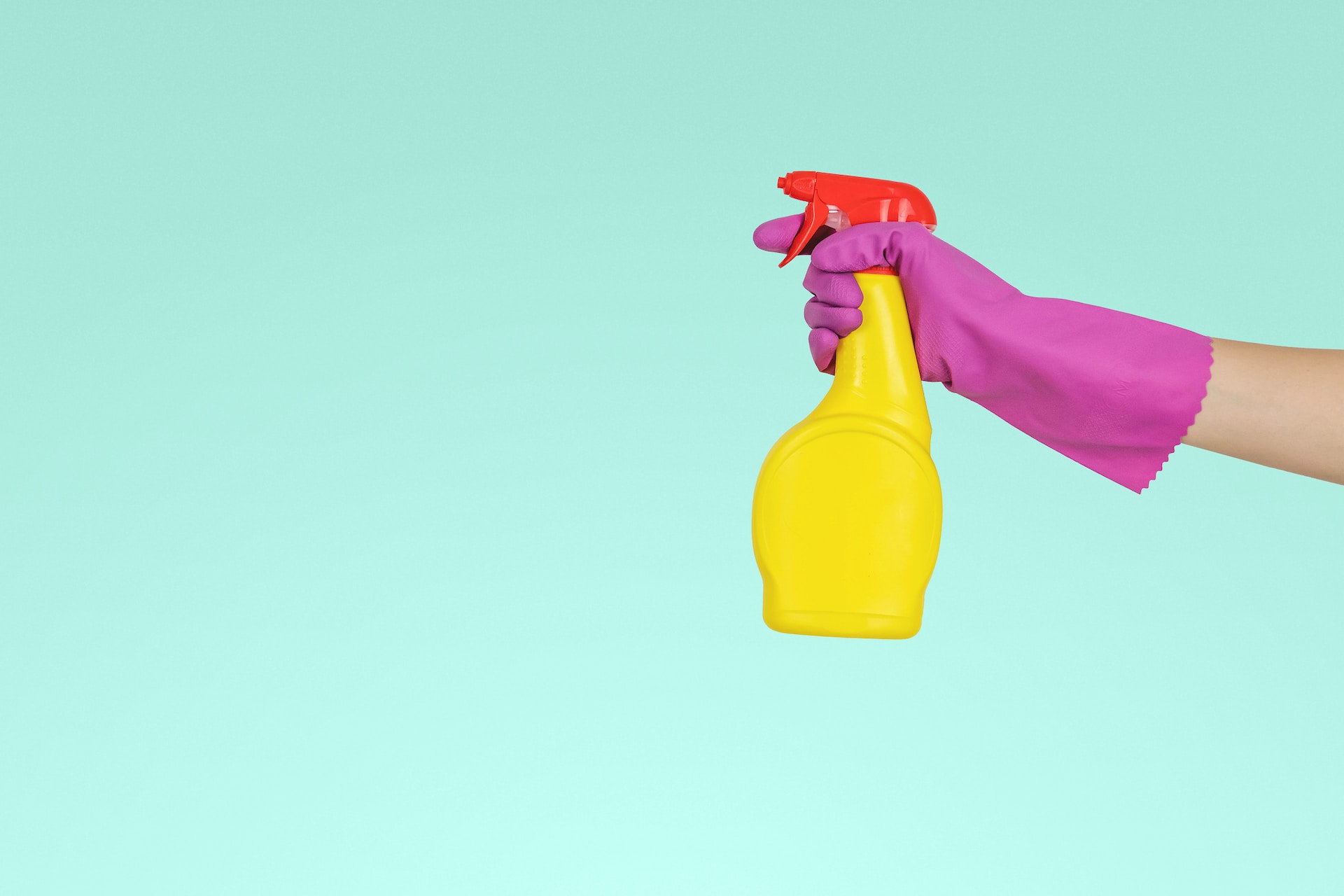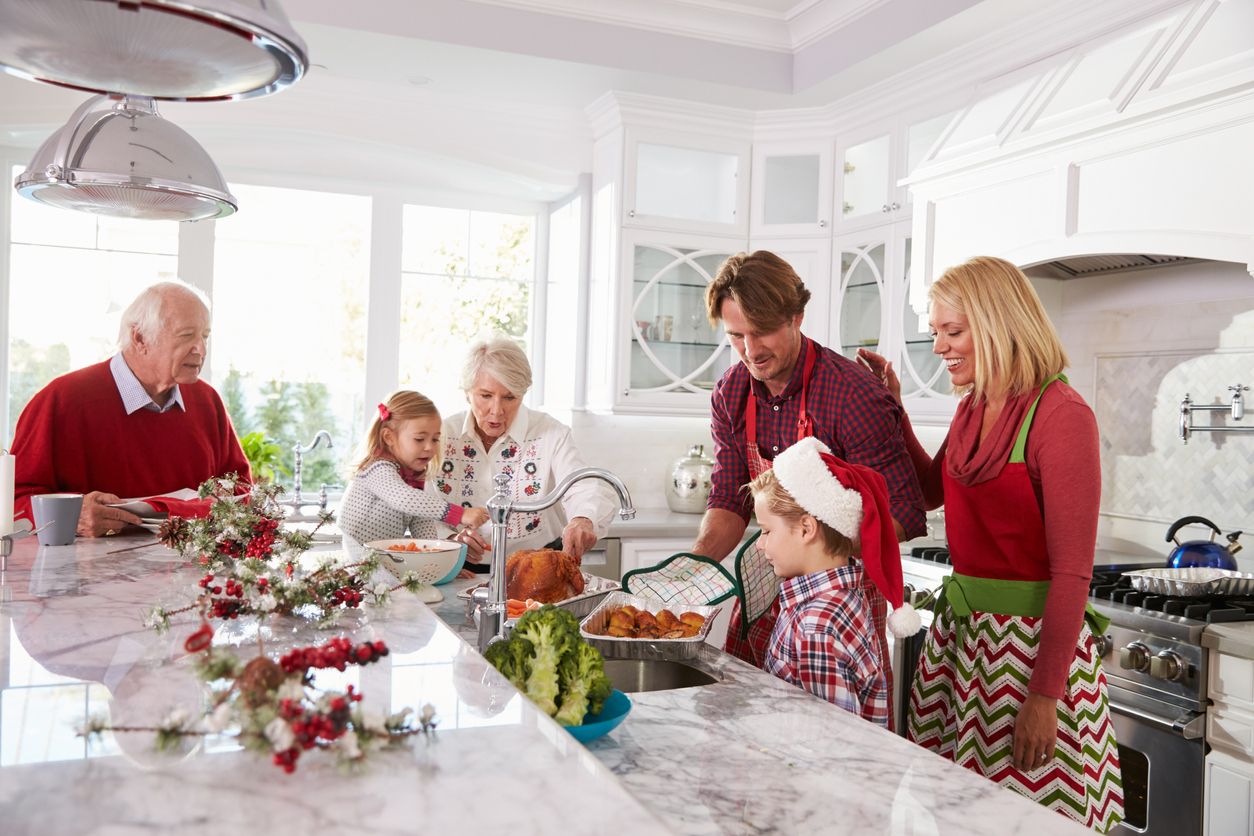Whether caring for someone in your household or having tested positive, you may wonder how to clean your house correctly after a COVID-19 recovery.
Cleaning with a household cleaner that contains soap or detergent reduces the number of germs on surfaces and decreases the risk of infection from surfaces. Disinfection to minimize transmission of COVID-19 at home is likely not needed unless someone in your home is sick or someone positive for COVID-19 has been in your home within the last 24 hours.
Here, we answer these questions and offer practical cleaning tips from the experts to prevent the spread of germs at home. Remember to always refer to your state health authority guidelines.
What are the steps of a daily cleaning routine?
Let’s begin in the morning,
- Make your bed.
- After a long day at work or in your home office it is nice to go to bed where it’s inviting and looking fresh with the pillows arranged.
- After showering, keep a squeegee in the shower area and quickly squeegee off the water from the glass, walls and floor into the drain. Leave the door open and let it air out during the day. Less water mean less chances of mildew forming.
After eating meals at home,
- Which ever appliance you use, toaster, microwave or oven make sure you wipe the inside for any spills and outside for finger prints.
- Counter/table tops, wipe these of any food particles to avoid attracting bugs into the home.
- Run a cordless vacuum quickly to pick up food particles.
- Leave the sink empty of dishes and clean at all times.
Do not wear outside shoes inside! Think about the “things” we step on daily. Leave it in the garage. These are simple yet effective habits to create for a peace of mind in your “Happy Place” called HOME!
How to keep all the surfaces in your house clean?
Cleaning your home’s surfaces regularly can help reduce allergens and germs that cause various illnesses. Make sure to use the right type of cleaner for the right job to ensure optimal clean without ruining any surfaces! Use the proper gear and follow label instructions to ensure safe handling. As a paper manufacturer, we recommend using disposable paper towels for cleaning – reusable towels can further spread germs and contaminate already clean surfaces.
What are the most essential parts to clean in your property if you are hosting international guests?
How to sanitize your new house when moving in?
How to keep bacteria away from entering your home? What are the most bacteria prone areas?
How to safely store house cleaning products and how to handle them safely to sanitize your house?
There’s never been a more important time to keep your house clean and sanitized. However, keep in mind that cleaning products often have toxic, corrosive or flammable properties.
It’s best to store cleaning products in a cool, dry position – out of direct sunlight. Also keep in mind to store these chemicals away from children and pets, and keep the chemical labels on so all adults in the household know the hazards associated with the product. If you’re handling larger volumes of cleaning products, such as running a home cleaning service, consider investing in a chemical cabinet that can minimize the risk of spills and harmful vapors.
Leisa Andersen from STOREMASTA
How to make cleaning fun (enjoyable activity) for the whole family?
How to keep your house clean after the pandemic at all times?
Now that we are back to our normal lives, it is important for us to take care of ourselves and our loved ones. We need to make sure that we are feeling well enough so that we can do what needs to be done without any distractions or obstacles in our way.You can’t get rid of everything in a day or two. It’s important to take one thing at a time and make sure you’re doing what’s necessary to keep it clean and safe.Don’t use harsh chemicals on anything that isn’t cloth. Make sure that all surfaces are wiped down regularly with an antibacterial wipe or damp cloth (or both!).If you have to use chemicals, use them as little as possible and avoid using them when they aren’t necessary (for example, if there’s no visible dirt on the surface).Keep everything off the floor—especially bedding and rugs—so bacteria don’t get trapped under them!Vacuum regularly. You might not feel like it, but vacuuming every day can make a huge difference in keeping your house from getting dirty. It’s also good for your backThis means that we need to make sure that our homes are clean and organized at all times so that everyone can enjoy their lives as they were before the pandemic started! It is also important for us to keep our children safe by teaching them how they can protect themselves from being harmed by germs or viruses. In the aftermath of a pandemic, you may be overwhelmed by the desire to take care of yourself and your loved ones. But before you can do that, you have to keep your home clean! Book a professional cleaner who can give you the right process and most effective machines and solutions for proper sanitation and disinfection.
K. Litonjua from Busy Bee Cleaning Co.
How to protect your laundry (especially bedding) from carrying COVID-19?
- Keep laundry (especially bedding) that is contaminated with the virus separate from the other laundry and safely remove all personal waste before you put it in the machine.
- Wash and dry clothes at high temperatures as this helps to kill bacteria effectively.
- Use a detergent with gentle bleaching agents that will get to work on bacteria.
- Sanitize all surfaces where do you the laundry before and after cleaning.
Change clothes and bedding on a regular basis to keep your home free of Covid-19 and other viruses.
Manny from 1 Stop Wash
How and where to keep your laundry fresh to avoid bacteria?
So we do use ozone system for our laundry which kills bacteria/bed bugs/viruses with a single wash and we keep the laundry sealed as soon as we fold and bag them.
Chandrabhanu Ranaweera from Lav Laundry Service
Best tips on cleaning mold prone areas to avoid illnesses?
If you live in a warm and humid climate, certain areas of your home, such as window frames and bathrooms, may be prone to mold growth. Luckily, cleaning these areas regularly can help to prevent the buildup of mold in the first place. In addition to making sure your home is well ventilated, you can use vinegar to clean these mold prone areas, as it has the ability to kill mold spores, and is a safe and all natural cleaning product for most surfaces. You can mix your favorite essential oil to your vinegar solution if you are sensitive to the smell. Simply spray a vinegar and water mixture on the mold prone area, let it sit for a few minutes, and wipe it using a microfiber cloth. You can add baking soda to the mixture for extra scrubbing power as well. If mold is already present, make sure to wear a mask when cleaning the area, as mold can be a respiratory irritant, and even gloves and eye protection. You may need to let the vinegar sit for more time to help break down the mold, or spray and scrub at it multiple times.
Evan Blumberg from Mulberry Maids
What is the best natural house cleaning/disinfecting substances to use?
Add thyme oil to your washing water when you clean cutting boards and kitchen utensils – it’s great for disinfecting food-borne nasties.
Mix white vinegar and water in a spray bottle and use it to sanitize your kitchen counters and bathrooms – and it’s great for getting rid of mildew too! Add baking soda for more stubborn stains that you need to scrub. Add essential oils of your choice for a heavenly smell – I like tea tree, lemongrass and ylang ylang oils.
Clare from EcoFriendly Link
How to create a DIY antibacterial multipurpose spray cleaner for house cleaning?
There are particular blends of essential oils that are very effective in killing off bacteria. Bathrooms can harbor potentially dangerous strains of bacteria that are difficult to kill – even if you do use toxic chemicals – as over time they are becoming more resistant.
Cinnamon Leaf, Clove Bud and Tea Tree essential oils when combined become a serious force to be reckoned with, together with Green Goddess Premium White Vinegar they are anti-fungal, antiviral and antibacterial making this a powerful combination for the smallest room of the house.
DIY Bathroom Spray Cleaner
- 100ml Green Goddess Premium White Vinegar (double strength at 9.9 % acidity)
- 400ml Filtered water
- 1 ml Cinnamon Leaf Essential Oil
- 1 ml Clove Bud Essential Oil
- .5 ml Tea Tree Essential Oil
Mix together and put into a spray bottle, shake well and spray onto and around the toilet bowl, clean as usual. Be sure to shake the bottle before each use to ensure the oils are evenly distributed.
After cleaning the toilet with Peppermint Toilet Cleaner I then spray this cleaner around and up under the rim and wipe over any areas around the toilet, I also use this on the vanity and in the shower to give it a good clean clean and help to prevent mould spores from growing.
Triona from Green Goddess
What are the benefits of steam cleaning?
How dry steam cleaning is beneficial in fighting viruses and bacteria?
What is the difference between a maid and a housekeeper?
What are the benefits of having a professional in-house cleaning staff compared to DIY house cleaning?
How do pets carry viruses and how to keep your house clean with pets?
- Regularly clean and disinfect all surfaces that both the pets and owners frequent in common.
- Clean your rugs with a steamer.
- Have an ozone generator machine to trap and kill bacteria and viruses in the air.
- Potty train your pets.
- Make sure your pet’s shots are up to date.
Hernan Romero from X-Act Care
What are the essential cleaning supplies every household needs?
The most essential cleaning products to keep stock for your home are the exact supplies needed to keep your home sanitized and maintained properly. I’d highly advise you to follow the manufacturers recommended products above all else especially if your countertops, floors, wall tile, windows, and/or appliances are new. However, if you’re not aware of these cleaning products, it’s always a safe bet to go with natural, chemical-free cleaners. There are many tips and tricks found online for using peroxide, rubbing alcohol, baking soda, and bleach, but I’d be very careful as you should always consider the surface that you’re cleaning.
Here is a good cleaning supply list for homes:
- Glass cleaner
- Polish for wood, granite, and stainless steel (not necessarily an all-in-one solution)
- An assortment of towels (microfiber, 100% cotton, and terry cloth is just fine)
- Non-scratch scour pads and soft cleanser
- Various types and sizes of cleaning brushes
- Dusting apparatus for surfaces, floors, furniture and walls
- Disinfectant safe for hard and soft surfaces
- Plastic multi-use scraper blade
- Hepa-filtered vacuum safe for floors and carpet
- Good mopping system for floors
